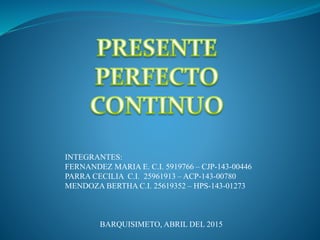
Presentacion ingles uny
- 1. INTEGRANTES: FERNANDEZ MARIA E. C.I. 5919766 – CJP-143-00446 PARRA CECILIA C.I. 25961913 – ACP-143-00780 MENDOZA BERTHA C.I. 25619352 – HPS-143-01273 BARQUISIMETO, ABRIL DEL 2015
- 2. PRESENTE PERFECTO CONTINUO: Se usa para acciones que han comenzado en el pasado y siguen todavia en el presente o han acabado recientemente Ejemplo: I have been watching tv for six hours ( he estado viendo la tele durante seis horas) ESTRUCTURA AFIRMATIVO: [SUJETO] + have/has been + [VERBO EN GERUNDIO (-ing form)] He has been singing in the morning (el ha estado cantando en la mañana) They have been playing all day (ellos han estado jugando todo el dia)
- 3. ESTRUCTURA NEGATIVA: [SUJETO] + have/has not been + [VERBO EN GERUNDIO (-ing form)] I have not been working much on my project (No he estado trabajando mucho en mi proyecto) They have not been walking in the park for an hour (Ellos no han estado caminando en el parque por una hora) ESTRUCTURA INTERROGATIVA: [PARTÍCULA INTERROGATIVA] + have/has + [SUJETO] + been +[VERBO EN GERUNDIO (-ing form)] Where have you been living lately? (¿Dónde has estado viviendo últimamente?) Have you been working in this restaurant for fiveyears? (Ha estado trabajando en este restaurante por cinco años?)
- 5. PASADO PERFECTO CONTINUO: Expresa un evento que empezó en algun momento en el pasado, duró un tiempo y terminó en el pasado. Ejemplo: We had been working hard (Habíamos estado trabajando duro) ESTRUCTURA AFIRMATIVO: [subject + had + been + participio presente (verbo acabado en -ing)] I had been thinking about work when she rang me (Había estado pensando en el trabajo cuando me llamó) He had been practicing his English with us (Él había estado practicando su inglés con nosotros)
- 6. ESTRUCTURA NEGATIVA: subject + hadn't / had not + been + participio presente (verbo acabado en -ing) I had not been studying for long when my friend phoned me. (No llevaba estudiando mucho tiempo cuando mi amiga me llamó por teléfono) I hadn´t been painting your house (No había estado pintando tu casa) ESTRUCTURA INTERROGATIVA: (question word) + had + subject + been + participio presente (verbo acabado en -ing)? Had you been sleeping in their house? (¿Habíais estado durmiendo en su casa?) Why had she been crying? (¿Por qué había estado llorando?)
- 8. FUTURO PERFECTO CONTINUO: Se usa para expresar cuánto tiempo habrá durado una acción en un determinado momento del futuro. Ejemplo: Sara will have been going to the beach by weekend (Sara habrá estado yendo a la playa para el fin de semana) ESTRUCTURA AFIRMATIVO: (Sujeto + will + have + been + verbo en forma -ing +) I'll have been running for over an hour (Llevaré corriendo más de una hora) You will have been saving money for 50 years (Habrás estado ahorrando dinero 50 años.)
- 9. ESTRUCTURA NEGATIVO: Sujeto + shan´t/won't + have + been + verbo en forma -ing + She´ll not have been using my bike (No habrá estado usando mi bici) He won´t have been playing cards (No habréis estado jugando a las cartas) ESTRUCTURA INTERROGATIVA: will/shall + [SUJETO] + have been [GERUNDIO DEL VERBO]? will we have been traveling? (¿Habremos estado viajando?) Won't you have been driving fast? (¿No habréis estado conduciendo rápido?)